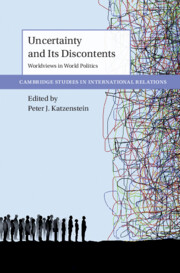Crossref Citations
This Book has been
cited by the following publications. This list is generated based on data provided by Crossref.
Katzenstein, Peter J.
2021.
Daniel Philpott: Bridging Secular and Religious Politics in International Relations.
The Review of Faith & International Affairs,
Vol. 19,
Issue. 4,
p.
36.
Voelkner, Nadine
and
Zanotti, Laura
2022.
Ethics in a Quantum World.
Global Studies Quarterly,
Vol. 2,
Issue. 3,
Alekseeva, Tatyana A.
2023.
New Reversals in the Theory and Methodology of Political Science: Introducing the Issue.
RUDN Journal of Political Science,
Vol. 25,
Issue. 4,
p.
759.
Ang, Yuen Yuen
2024.
Ambiguity and Clarity in China's Adaptive Policy Communication.
The China Quarterly,
Vol. 257,
Issue. ,
p.
20.
Avant, Deborah
2024.
Between Probability and Possibility: Fostering Productive Research in a Dystopian Moment.
International Studies Review,
Vol. 26,
Issue. 3,
Ivanov, D. Yu.
2024.
Concepts of Political Worldviews of the Eurasian Space in the Communicative Practice of Think Tanks.
EURASIAN INTEGRATION: economics, law, politics,
Vol. 17,
Issue. 4,
p.
121.
Zanotti, Laura
2024.
Cosmologies, coloniality and quantum critique: Exploring conversations with Native American ways of knowing.
Journal of International Political Theory,



